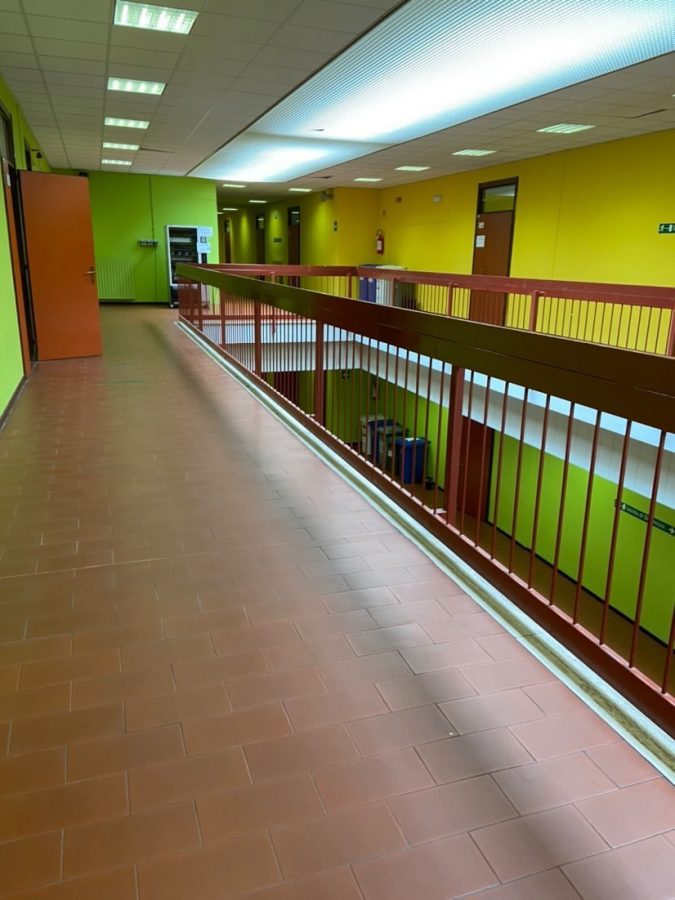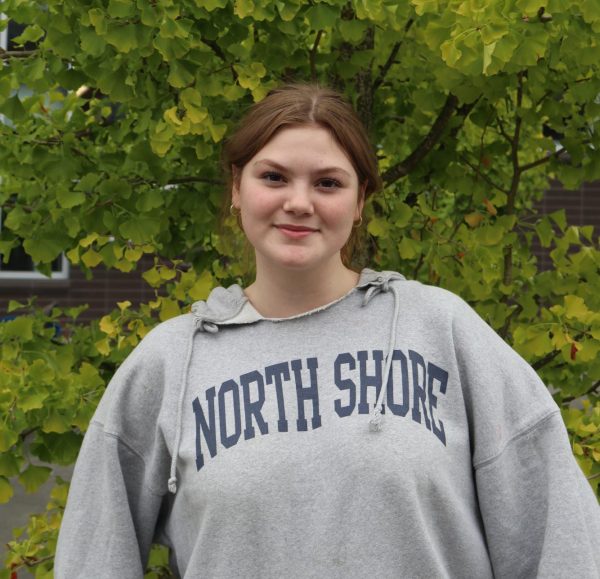Isabel in Italy – covid, stereotypes, and realizations
June 9, 2021
Unless you were born this year or were at the International Space Station during 2020, you experienced the COVID-19 outbreak. But not many of us can say we were in a completely different country during it.
Isabel Kaplan, a junior, experienced the outbreak while on exchange in Italy and has had a wild ride since then. However, her exchange story doesn’t start or end there.
Shorewood has had a number of exchange students in recent years, one being Lola Spesivets from Ukraine. The family of current juniors Lindsey and William Hiett hosted Spesivets, and Kaplan, one of Lindsey Hiett’s friends, was inspired. “I was like ‘Hey what if I was an exchange student?’” Kaplan said.
Kaplan, a former French student at Shorewood, originally thought of doing her exchange in France, as that seemed to make the most sense.
“I had visited both France and Italy. There was something about Italy that seemed really special. I fell in love with everything about it. The language is beautiful, the food is obviously amazing, and the people were so nice and welcoming,” she said. Kaplan ended up choosing to go to Italy during the second semester of her sophomore year, in the 2019-2020 school year.
After lots of paperwork, sending photos of herself and her family, as well as filling out a form of what she wanted her host family to be like, she got assigned a host family in Caserta, Italy, which is in the southern part of the nation, near Naples.
Kaplan began learning Italian through online lessons but only was able to complete two months of learning before setting off to Italy. Although she only knew the basics, Kaplan was very excited. Her parents had mixed feelings. “Deep down [they were] excited for me…but they were sad and a little bit worried for me to be gone for so long and to be so far away,” said Kaplan.
In January 2020, Kaplan was in Italy. For a couple of months, Kaplan was making friends, and learning Italian, although it was rocky along the way.
“There were definitely times where I got super frustrated, ‘why can’t I understand, I must not be doing good’ there are times where it’s mentally exhausting, times where you feel alone because no one understands you, or you don’t understand them,” said Kaplan. What made it particularly difficult was the dialect of the region she was in. The Neapolitan dialect is well known in Italy for being hard to understand, at some point almost incomprehensible to other Italians. “As a foreigner learning Italian…it was extremely difficult,” said Kaplan.
But her classmates welcomed her with open arms, even on her first day of class. “They treated me like I had been in their class for three years. They welcomed me, they always included me in their conversations. We made tiktoks in the hallways. They were the nicest people I had ever met. I felt so comfortable even though we couldn’t communicate very well,” she said.
Once Kaplan had started getting the hang of Italian, and meeting people, coronavirus got to Italy. Similarly to Shorewood, Kaplan’s school got two weeks off of school at first, which most were happy about, and then quarantine kept extending. Quarantine in Italy was very serious.
“We weren’t allowed to step out of the house unless it was one person going to get groceries. There were police and national guard standing outside telling people to go in. It was like a zombie apocalypse,” she said. At first, her parents and host family agreed that Kaplan could stay in Italy.
However, the virus spread and worsened. “In the back of my head I knew that I would probably have to go home, but I didn’t want to believe it,” Kaplan said.
Eventually the day did come where she had to return home. “I got an email that said I had to leave and within 24 hours of that email I was on the plane going home,” she said. Sadly, Kaplan did not have the time to say goodbye to her Italian friends, but she was still very determined to make the most of her experience. “When I came back to Seattle I continued to do my classes in Italy,” she said. “I woke up at 2 am.”
You may think this was the end for Kaplan and Italy, but it was not. After some time processing all that had happened, in July of 2020, she decided she wanted to go back. This time, for a full year, yet the covid situation did not allow for that. Thus, she decided on second semester again, but in the 2020-2021 school year.
January 2021, Kaplan was back in Italy although not in the same location as before. Her second time, she found herself in Castelletto Ticino, Italy which is in the north near Milan. One thing Americans may not know is that Italy is quite divided: north versus south.
“The southern people say that the northern people are snobs, [and] cold people, and the northerners say the southerners are lazy, [and] don’t work,” she said. It may seem trivial, but Italians can take it quite far. “When I tell people here that last year I was in the south they tell me ‘poor you, you must’ve had a terrible experience,’” she added.
Northern and southern Italian stereotypes aren’t the only ones made though.
According to Kaplan, “Italians are obsessed with America” and she gets asked lots of stereotypical questions about the U.S.. “They think that everyone owns a gun. They’ve asked me if I have a gun, they ask me about Trump, and if Americans eat McDonalds and hamburgers everyday,” she said. Also, Italian schooling is less focused on social elements than in American schooling, so Italians ask “‘Do you really have lockers at school? Are there football games and cheerleaders?’” as well as asking about prom.
Although Italians are very interested in learning about America, Kaplan is focused on learning all she can about Italy. Some of what she loves most are “the little things of living in another country like…eating the grandma’s freshly homemade pasta, [and being] at school looking out the window and seeing a church from the 1400s” among other beautiful things about the country. Some other intriguing things she noticed were that Italians “dress a lot better” and that since “you can’t drive until you’re 18… people ride motorcycles and Vespas.” Kaplan added, “seeing everyone coming to school in their Vespas is so cool.”
She was so inspired by the country that she began making tiktoks about her Italian exchange to “show Americans what Italy is like, and maybe to inspire more people to go on exchange.” However, it didn’t happen the way Kaplan expected. Most of the people who saw her tiktoks were Italian. “They think that America is this perfect place…their idea of going on exchange means Italians going to America, and so when they saw me from America coming to Italy they were like ‘why would you want to come here, you live in the most perfect country’” Kaplan said.
Though she may not believe all of this to be true, she does agree Italy has some significant issues. Bigotry in various forms is what Kaplan noticed pretty quickly. She said, “In the south they are more racist, [and] homophobic. They have more traditional ideas… Racist jokes constantly…Here in the north, it’s better, but it’s not the same as [the Seattle area].” One factor may be how few non-white people there are in Italy. Kaplan could not recall seeing a single Asian person and hasn’t seen many other people of color either. Additionally, most Italians she had met were Catholic, and made some religiously bigoted comments. “When I was in the south, I heard anti-semitic things from people who didn’t know I was Jewish,” she said.
Some Italians believe that America is where they may be able to escape from bigotry, whether Americans believe America is less bigoted or not. Kaplan mentioned that on her prior Italian exchange, a gay student in her host mother’s class told her something quite revealing of the culture: “‘I’m so surprised that you’re talking to me, no one ever wants to be my friend. I feel like I don’t fit in here. I just want to go to America where I’ll be accepted.’” Though those of us in the greater Seattle area may not realize, we’re fortunate to live here even though it’s not perfect, she said.
Seeing America with a different lens is something Kaplan appreciates.
“One of the most beautiful parts of [going on exchange] is getting to know other people from a different country who speak a different language because even though we live in completely different countries we have a lot in common,” she said. “Seeing America, the place you come from, with a different set of eyes…is also something important.”
This experience has opened up a new possible occupation for Kaplan, as she mentioned she was interested in becoming an English teacher in a foreign country. For her, though Italy has faults, she said: “I feel like I’m living my dream here.”
Isabel Kaplan is willing to answer questions for Shorewood students regarding exchanges through her email: [email protected]





Molly Krulewitch • Jun 14, 2021 at 1:27 pm
jade jade jade this is such a good article. i loved how it flowed from topic to topic and how captivating it was. really fun to read!